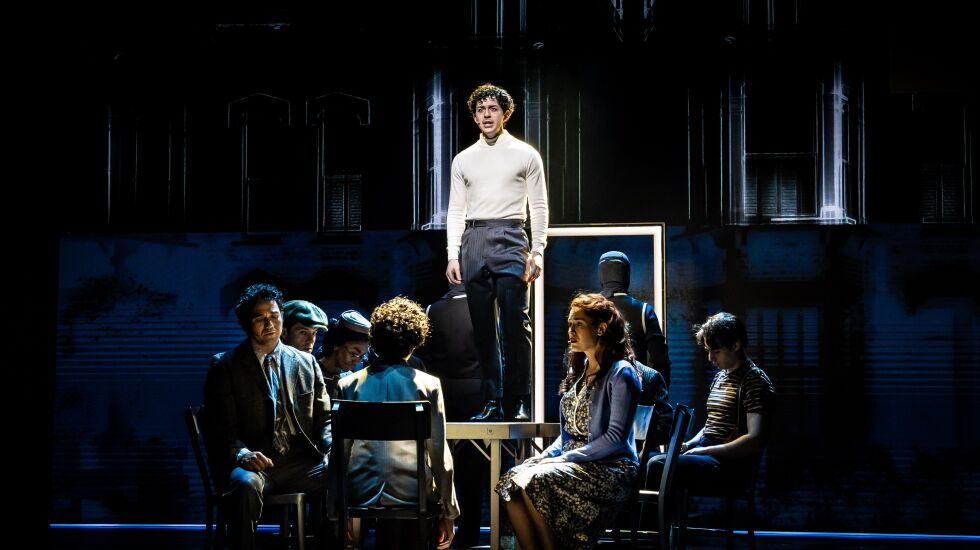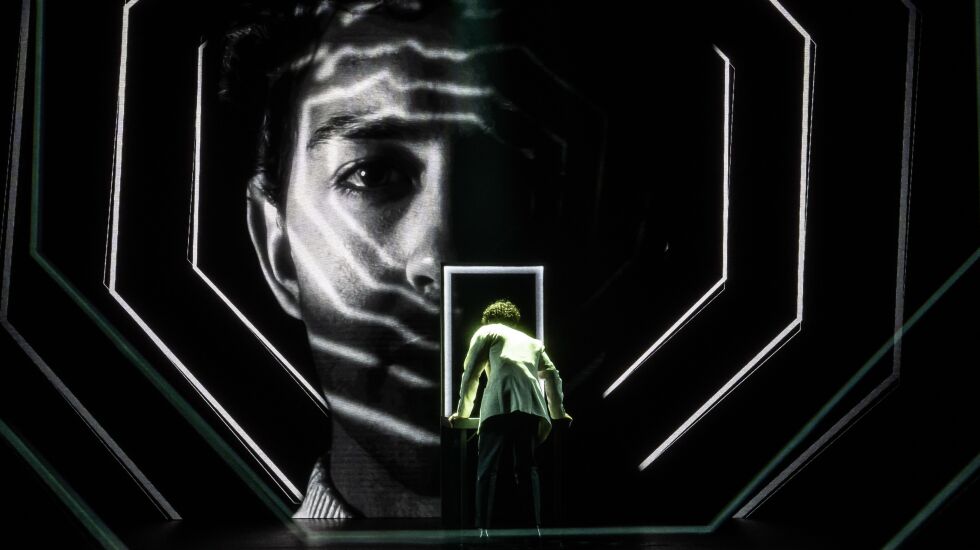
There’s a remarkable scene (one of many) in the first act of Peter Townshend’s seminal rock opera “The Who’s Tommy” when the titular anti-hero is hoisted skyward by a frenetic chorus. Tommy is a 4-year-old child in the scene, and as the score spirals and whirls, the airborne tyke essentially becomes a human pinball, set spinning in a cacophonous sonic blizzard that overwhelms the senses.
So it goes throughout the musical, now in a major “re-imagined” reboot at the Goodman Theater. Directed by Des McAnuff and featuring a book co-written by McAnuff and Townshend, “Tommy” remains the pulsing roller coaster of a show it was when it premiered in 1992. With the score taken from the Who’s 1969 concept album, “Tommy” remains as fresh and vital as it was when Nixon was president and the Vietnam war dominated the headlines.
As Tommy evolves from traumatized four-year-old child to messianic adult, the musical offers a two pronged parable: On the one hand, it’s an incandescent, pile-driving cautionary tale about putting unwavering, blind faith in mere mortals. On the other, it’s an unexpectedly uplifting hero’s quest that points to the seemingly limitless power of mortals to overcome even the most horrific of circumstances.
The lyrics tell us that Tommy, “that deaf, dumb and blind kid, sure plays a mean pinball.” But more than that, “Tommy” shows the quest for freedom and wholeness can succeed even in a world that’s rotten with cruelty.
At the blazing heart of “Tommy” is the score Townshend penned: The songs — including hits such as “I’m Free,” “ See Me/Feel Me,” and “Pinball Wizard” — illuminate scenes from the singular life of Tommy Walker, born in England while his father, Captain Walker (Adam Jacobs), is missing in action and presumed dead, a casualty of World War II. Tommy’s mother (Alison Luff) takes up with another man; both are shocked when the Captain unexpectedly returns home very much alive. At 4, Tommy (Presley Rose Jones opening night, Ava Rose Doty at some performances) witnesses the lethal outcome of the doomed love triangle and is left without sight, hearing or speech by the trauma.

At a loss over how to deal with the changes in their child, the Captain and Mrs. Walker leave Tommy to be violently bullied by his sadistic cousin Kevin (Bobby Conte), plied with hallucinogens by the Acid Queen (Christina Sajous) and assaulted by his pedophile Uncle Ernie (John Ambrosino).
As we watch Tommy grow from 4 to 10 (Annabel Finch opening night, Ezekiel Ruiz some performances) to adulthood (Ali Louis Bourzgui), he’s initially little more than an eerie puppet of a character: A body manipulated not by autonomy but by the onslaught of events that overtake it.
From overture to finale, McAnuff’s more than three-dozen strong cast never lets up. “Tommy” is almost entirely sung-through, with very little dialogue; the ensemble makes the operatic structure feel both natural and inevitable. The storytelling gets a crucial assist from choreographer Lorin Latarro, who creates stage pictures that range from profoundly disturbing (“Cousin Kevin,” “Fiddle About”) to benedictory (“I’m Free,” “We’re Not Gonna Take It””).
The child Tommys are downright eerie in their commitment to his dead-eyed helplessness, cherub zombies that are as spooky as they are heart-wrenching. Ambrosino’s Uncle Ernie is also unnerving, a tormented soul whose twitchy affliction is as vile as your worst nightmare.
But the heart and soul of Tommy is Bourzgui’s Tommy. He’s on stage practically the entire show, delivering a star-making performance defined by powerhouse vocals and a balletic grace that makes Latorro’s choreography fly. Tommy’s zombie-like affect is the stuff of nightmares, and it makes his eventual breakthrough all the more powerful.

As you might expect from a show with a character (and a song) called The Acid Queen (Sajous is at once wildly charismatic and undeniably menacing as a would-be healer), “Tommy” is at times a hallucinatory ride, never more so than when adult Tommy stares down his child self in a mirror, eventually causing the glass to fracture and crack into countless pieces. Once shattered, Tommy breaks free of his own limitations, moving from silent, helpless child to Christ-like adult trailed by teeming masses wherever he goes.
The Goodman has pulled out all the stops for the production, including installing half a dozen clanging pinball machines in the lobby. Get there early; you can test your very own pinball wizard prowess.







